leave与forget的用法区别
高考英语 常考基本词汇讲解讲义(六)
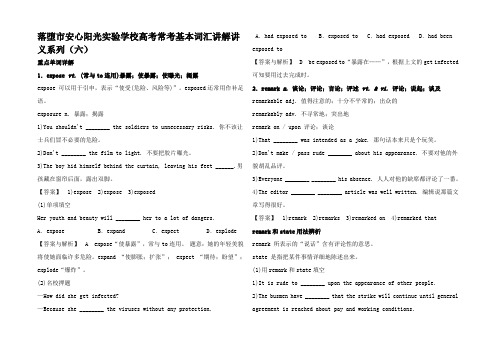
落堕市安心阳光实验学校高考常考基本词汇讲解讲义系列(六)重点单词详解1.expose vt. (常与to连用)暴露;使暴露;使曝光;揭露expose 可以用于引申,表示“使受(危险、风险等)”。
exposed还常用作补足语。
exposure n. 暴露;揭露1)You shouldn't ________ the soldiers to unnecessary risks. 你不该让士兵们冒不必要的危险。
2)Don't ________ the film to light. 不要把胶片曝光。
3)The boy hid himself behind the curtain, leaving his feet ______.男孩藏在窗帘后面,露出双脚。
【答案】1)expose 2)expose 3)exposed(1)单项填空Her youth and beauty will ________ her to a lot of dangers. A.expose B.expand C.expect D.explode 【答案与解析】 A expose“使暴露”,常与to连用。
题意:她的年轻美貌将使她面临许多危险。
expand “使膨胀;扩张”; expect “期待;盼望”;explode“爆炸”。
(2)名校押题—How did she get infected?—Because she ________ the viruses without any protection. A.had exposed to B.exposed to C.had exposed D.had been exposed to【答案与解析】 D be exposed to“暴露在……”,根据上文的get infected 可知要用过去完成时。
2.remark n.谈论;评论;言论;评述vt. & vi.评论;说起;谈及remarkable adj. 值得注意的;十分不平常的;出众的remarkably adv. 不寻常地;突出地remark on / upon 评论;谈论1)That ________ was intended as a joke. 那句话本来只是个玩笑。
leave和forget均可表示
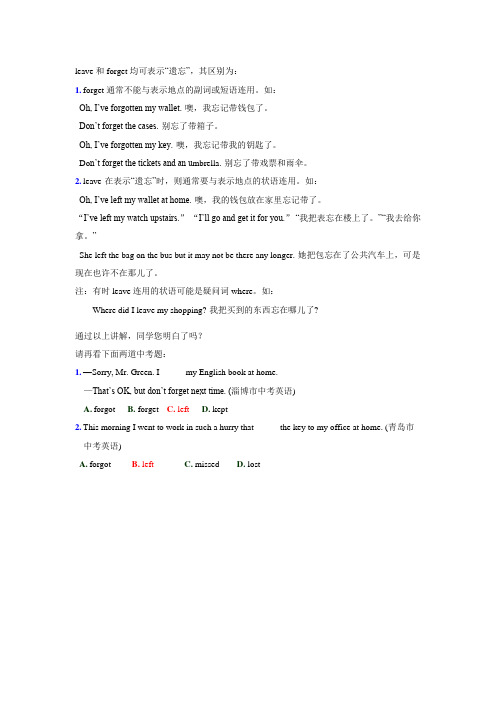
leave和forget均可表示“遗忘”,其区别为:1.forget通常不能与表示地点的副词或短语连用。
如:Oh, I’ve forgotten my wallet.噢,我忘记带钱包了。
Don’t forget the cases.别忘了带箱子。
Oh, I’ve forgotten my key.噢,我忘记带我的钥匙了。
Do n’t forget the tickets and an u mbrella.别忘了带戏票和雨伞。
2.leave在表示“遗忘”时,则通常要与表示地点的状语连用。
如:Oh, I’ve left my wallet at home.噢,我的钱包放在家里忘记带了。
“I’ve left my watch upstairs.”“I’ll go and get it for you.”“我把表忘在楼上了。
”“我去给你拿。
”She left the bag on the bus but it may not be there any longer.她把包忘在了公共汽车上,可是现在也许不在那儿了。
注:有时leave连用的状语可能是疑问词where。
如:Where did I leave my shopping?我把买到的东西忘在哪儿了?通过以上讲解,同学您明白了吗?请再看下面两道中考题:1.—Sorry, Mr. Green. I _____ my English book at home.—That’s OK, but don’t forget next time. (淄博市中考英语)A.forgotB. forgetC. leftD. kept2.This morning I went to work in such a hurry that _____ the key to my office at home. (青岛市中考英语)A.forgotB. leftC. missedD. lost。
八年级上册英语语法知识点复习

八年级上册英语语法知识点复习语法是语言当中最重要的也是最基础的句子组成结构,下面是小编给大家带来的八年级上册英语语法知识点复习,希望能够帮助到大家!八年级上册英语语法知识点复习1) leave的用法1.“leave+地点”表示“离开某地”。
例如:When did you leave Shanghai? 你什么时候离开上海的?2.“leave for+地点”表示“动身去某地”。
例如:Next Friday, Alice is leaving for London. 下周五,爱丽斯要去伦敦了。
3.“leave+地点+for+地点”表示“离开某地去某地”。
例如:Why are you leaving Shanghai for Beijing? 你为什么要离开上海去北京?2) 情态动词should“应该”学会使用should作为情态动词用,常常表示意外、惊奇、不能理解等,有“竟会”的意思,例如:How should I know? 我怎么知道?Why should you be so late today? 你今天为什么来得这么晚?should有时表示应当做或发生的事,例如:We should help each other.我们应当互相帮助。
我们在使用时要注意以下几点:1. 用于表示“应该”或“不应该”的概念。
常指长辈教导或责备晚辈。
例如:You should be here with clean hands. 你应该把手洗干净了再来。
2.用于提出意见劝导别人。
例如:You should go to the doctor if you feel ill. 如果感觉不舒服,你最好去看医生。
3. 用于表示可能性。
should的这一用法是考试中常常出现的考点之一。
例如:We should arrive by supper time. 我们在晚饭前就能到了。
She should be here any moment. 她随时都可能来。
高中英语单词天天记leave素材
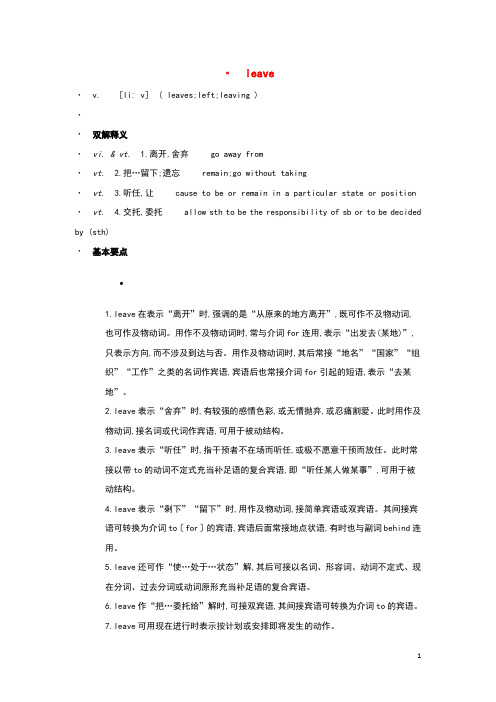
· leave· v. [liːv] ( leaves;left;leaving )·· 双解释义· vi. & vt. 1.离开,舍弃go away from· vt. 2.把…留下;遗忘remain;go without taking· vt. 3.听任,让cause to be or remain in a particular state or position · vt. 4.交托,委托allow sth to be the responsibility of sb or to be decided by (sth)· 基本要点•1.leave在表示“离开”时,强调的是“从原来的地方离开”,既可作不及物动词,也可作及物动词。
用作不及物动词时,常与介词for连用,表示“出发去(某地)”,只表示方向,而不涉及到达与否。
用作及物动词时,其后常接“地名”“国家”“组织”“工作”之类的名词作宾语,宾语后也常接介词for引起的短语,表示“去某地”。
2.leave表示“舍弃”时,有较强的感情色彩,或无情抛弃,或忍痛割爱。
此时用作及物动词,接名词或代词作宾语,可用于被动结构。
3.leave表示“听任”时,指干预者不在场而听任,或极不愿意干预而放任。
此时常接以带to的动词不定式充当补足语的复合宾语,即“听任某人做某事”,可用于被动结构。
4.leave表示“剩下”“留下”时,用作及物动词,接简单宾语或双宾语。
其间接宾语可转换为介词to〔for〕的宾语,宾语后面常接地点状语,有时也与副词behind连用。
5.leave还可作“使…处于…状态”解,其后可接以名词、形容词、动词不定式、现在分词、过去分词或动词原形充当补足语的复合宾语。
6.leave作“把…委托给”解时,可接双宾语,其间接宾语可转换为介词to的宾语。
leave的用法

) leave的用法1.“leave+地点”表示“离开某地”。
例如:When did you leave Shanghai? 你什么时候离开上海的?2.“leave for+地点”表示“动身去某地”。
例如:Next Friday, Alice is leaving for London.下周五,爱丽斯要去伦敦了。
3.“leave+地点+for+地点”表示“离开某地去某地”。
例如:Why are you leaving Shanghai for Beijing? 你为什么要离开上海去北京?2) 情态动词should“应该”学会使用should作为情态动词用,常常表示意外、惊奇、不能理解等,有“竟会”的意思,例如:How should I know? 我怎么知道?Why should you be so late today? 你今天为什么来得这么晚?should有时表示应当做或发生的事,例如:We should help each other.我们应当互相帮助。
我们在使用时要注意以下几点:1. 用于表示“应该”或“不应该”的概念。
此时常指长辈教导或责备晚辈。
例如:You should be here with clean hands. 你应该把手洗干净了再来。
2. 用于提出意见劝导别人。
例如:You should go to the doctor if you feel ill. 如果你感觉不舒服,你最好去看医生。
3. 用于表示可能性。
should的这一用法是考试中常常出现的考点之一。
例如:We should arrive by supper time. 我们在晚饭前就能到了。
She should be here any moment. 她随时都可能来。
3) What...? 与Which...?1. what 与which 都是疑问代词,都可以指人或事物,但是what仅用来询问职业。
如:What is your father? 你父亲是干什么的?该句相当于:What does your father do? What is your father's job?Which 指代的是特定范围内的某一个人。
leave与forget用法区别
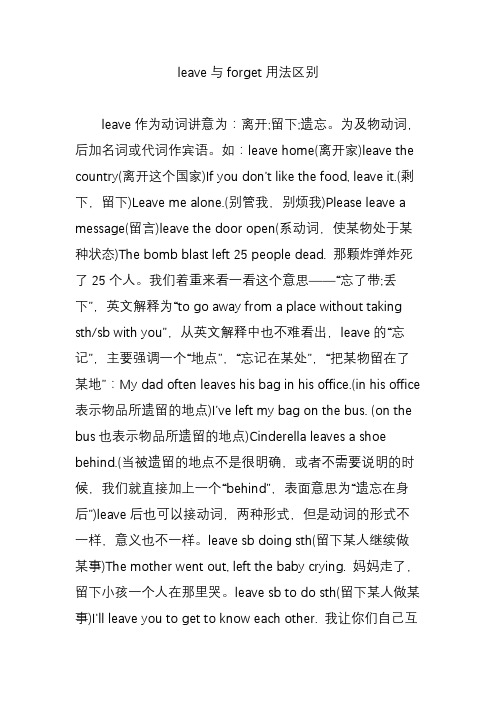
leave与forget用法区别leave作为动词讲意为:离开;留下;遗忘。
为及物动词,后加名词或代词作宾语。
如:leave home(离开家)leave the country(离开这个国家)If you don’t like the food, leave it.(剩下,留下)Leave me alone.(别管我,别烦我)Please leave a message(留言)leave the door open(系动词,使某物处于某种状态)The bomb blast left 25 people dead. 那颗炸弹炸死了25个人。
我们着重来看一看这个意思——“忘了带;丢下”,英文解释为“to go away from a place without taking sth/sb with you”,从英文解释中也不难看出,leave的“忘记”,主要强调一个“地点”,“忘记在某处”,“把某物留在了某地”:My dad often leaves his bag in his office.(in his office 表示物品所遗留的地点)I’ve left my bag on the bus. (on the bus也表示物品所遗留的地点)Cinderella leaves a shoe behind.(当被遗留的地点不是很明确,或者不需要说明的时候,我们就直接加上一个“behind”,表面意思为“遗忘在身后”)leave后也可以接动词,两种形式,但是动词的形式不一样,意义也不一样。
leave sb doing sth(留下某人继续做某事)The mother went out, left the baby crying. 妈妈走了,留下小孩一个人在那里哭。
leave sb to do sth(留下某人做某事)I'll leave you to get to know each other. 我让你们自己互相认识一下。
初二英语语法总结

1.“leave+地点”表示“离开某地”。
例如:When did you leave Shanghai?你什么时候离开上海的?2.“leave f or+地点”表示“动身去某地”。
例如:Next Friday, Alice is leaving for London.下周五,爱丽斯要去伦敦了。
3.“leave+地点+for+地点”表示“离开某地去某地”。
例如:Why are you leaving Shanghai for Beijing?你为什么要离开上海去北京?should 作为情态动词用,往往表示意外、惊奇、不能理解等,有“竟会”的意思,例如:How should I know? 我怎么知道?Why should you be so late today? 你今天为什么来得这么晚?should 有时表示应当做或者发生的事,例如:We should help each other.我们应当互相匡助。
我们在使用时要注意以下几点:1. 用于表示“应该”或者“不应该”的概念。
此时常指长辈教导或者谴责晚辈。
例如:You should be here with clean hands. 你应该把手洗干净了再来。
2. 用于提出意见劝导别人。
例如:You should go to the doctor if you feel ill. 如果你感觉不舒畅,你最好去看医生。
3. 用于表示可能性。
should 的这一用法是考试中往往浮现的考点之一。
例如:We should arrive by supper time. 我们在晚饭前就能到了。
She should be here any moment. 她随时都可能来。
3) What...? 与Which...?1. what 与which 都是疑问代词,都可以指人或者事物,但是what 仅用来问询职业。
如:What is your father? 你父亲是干什么的?该句相当于:What does your father do?What is your father's job?Which 指代的是特定范围内的某一个人。
八年级英语语法总结

八年级,英语,语法,总结,八年级,英语,语法,八年级英语语法总结1) leave的用法1.“leave+地点”表示“离开某地”。
例如:When did you leave Shanghai?你什么时候离开上海的?2.“leave for+地点”表示“动身去某地”。
例如:Next Friday, Alice is leaving for London.下周五,爱丽斯要去伦敦了。
3.“leave+地点+for+地点”表示“离开某地去某地”。
例如:Why are you leaving Shanghai for Beijing?你为什么要离开上海去北京?2) 情态动词should“应该”学会使用should作为情态动词用,常常表示意外、惊奇、不能理解等,有“竟会”的意思,例如:How should I know? 我怎么知道?Why should you be so late today? 你今天为什么来得这么晚?should有时表示应当做或发生的事,例如:We should help each other.我们应当互相帮助。
我们在使用时要注意以下几点:1. 用于表示“应该”或“不应该”的概念。
此时常指长辈教导或责备晚辈。
例如:You should be here with clean hands. 你应该把手洗干净了再来。
2. 用于提出意见劝导别人。
例如:You should go to the doctor if you feel ill. 如果你感觉不舒服,你最好去看医生。
3. 用于表示可能性。
should的这一用法是考试中常常出现的考点之一。
例如:We should arrive by supper time. 我们在晚饭前就能到了。
She should be here any moment. 她随时都可能来。
3) What...? 与Which...?1. what 与which 都是疑问代词,都可以指人或事物,但是what仅用来询问职业。
leave 的用法
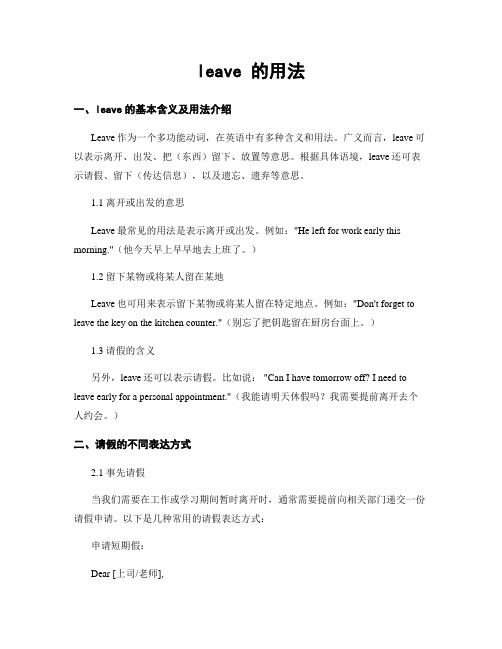
leave 的用法一、leave的基本含义及用法介绍Leave作为一个多功能动词,在英语中有多种含义和用法。
广义而言,leave可以表示离开、出发、把(东西)留下、放置等意思。
根据具体语境,leave还可表示请假、留下(传达信息),以及遗忘、遗弃等意思。
1.1 离开或出发的意思Leave最常见的用法是表示离开或出发。
例如:"He left for work early this morning."(他今天早上早早地去上班了。
)1.2 留下某物或将某人留在某地Leave也可用来表示留下某物或将某人留在特定地点。
例如:"Don't forget to leave the key on the kitchen counter."(别忘了把钥匙留在厨房台面上。
)1.3 请假的含义另外,leave还可以表示请假。
比如说: "Can I have tomorrow off? I need to leave early for a personal appointment."(我能请明天休假吗?我需要提前离开去个人约会。
)二、请假的不同表达方式2.1 事先请假当我们需要在工作或学习期间暂时离开时,通常需要提前向相关部门递交一份请假申请。
以下是几种常用的请假表达方式:申请短期假:Dear [上司/老师],I am writing to request a short leave from [日期] to [日期]. The purpose of my leave is [事由,可以是个人原因或紧急情况]. I understand the inconvenience caused by my absence, and I will finish all pending tasks before I leave.During my absence, I will be available via email or phone for any urgent matters that may arise. If necessary, please feel free to contact me. I will make sure to check my messages regularly during this period.Thank you for your understanding and support.Sincerely,[你的名字]申请长期假:Dear [上司/老师],I am writing to request an extended leave from [日期] to [日期]. This leave is due to [具体原因,如个人事务、医疗或家庭紧急情况]. I understand the impact my absence may have on the team/schoolwork, and I will do my best to minimize any disruption.During my leave, I can be reached via email or phone for any important matters that require my attention. If there are any significant developments or emergencies that need immediate action, please contact me as soon as possible.Thank you for your consideration and support in granting me this leave. I look forward to returning and resuming my responsibilities upon the completion of this leave.Sincerely,[你的名字]2.2 临时离开如果需要在一天内或数小时内暂时离开,请提前告知相关人员,并简要说明离开的原因和预计回归时间。
leave的用法和固定结构
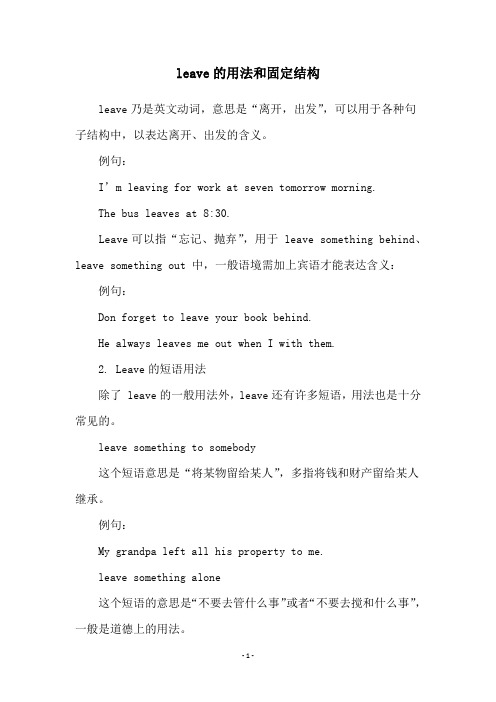
leave的用法和固定结构leave乃是英文动词,意思是“离开,出发”,可以用于各种句子结构中,以表达离开、出发的含义。
例句:I’m leaving for work at seven tomorrow morning.The bus leaves at 8:30.Leave可以指“忘记、抛弃”,用于 leave something behind、leave something out 中,一般语境需加上宾语才能表达含义:例句:Don forget to leave your book behind.He always leaves me out when I with them.2. Leave的短语用法除了 leave的一般用法外,leave还有许多短语,用法也是十分常见的。
leave something to somebody这个短语意思是“将某物留给某人”,多指将钱和财产留给某人继承。
例句:My grandpa left all his property to me.leave something alone这个短语的意思是“不要去管什么事”或者“不要去搅和什么事”,一般是道德上的用法。
例句:Leave him alone, he just needs some space.leave something out这个短语意思是“漏掉,不包括”,常用在不把某种情况放到心里,考虑起来,或是在列举情况时省略某一项。
例句:You have to check the list again to make sure you didn leave anything out.leave someone alone这个短语意思是“不去打扰某人”,一般是指给某人一定的空间自己想想问题,不要去管闲事。
例句:I think you should just leave her alone.leave someone/something behind这个短语的意思是“把某物忘在某处”,一般是指无意中忘记把某物带走,然而把它留在原处。
外研版中考英语复习考点梳理+真题训练:七年级下
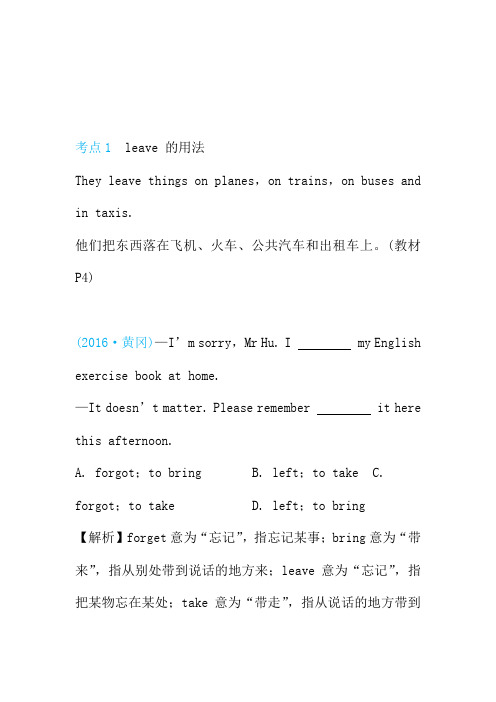
考点1leave 的用法They leave things on planes,on trains,on buses and in taxis.他们把东西落在飞机、火车、公共汽车和出租车上。
(教材P4)(2016·黄冈)—I’m sorry,Mr Hu. I my English exercise book at home.—It doesn’t matter. Please remember it here this afternoon.A. forgot;to bringB. left;to takeC. forgot;to takeD. left;to bring【解析】forget意为“忘记”,指忘记某事;bring意为“带来”,指从别处带到说话的地方来;leave意为“忘记”,指把某物忘在某处;take意为“带走”,指从说话的地方带到别处去。
由句意“对不起,胡老师,我把英语练习本忘在家里了。
”“没关系,请记得今天下午带到这儿来。
”可知,第一个空应填left,第二个空应填to bring。
故选D。
【答案】Dleave与forget的用法区别如下:1. (2015·江苏连云港)—Oh,my God!I my notebook in my bedroom.—It doesn’t matter. I’ll lend you mine.A. forgetB. forgotC. leaveD. left2. (2016·石家庄)Oh no!I my book in the lab.A. leaveB. leftC. will leaveD. was leaving【答案】1. D 2. B考点2数量的表达Hundreds of people come here every day. 每天有数百人来这里。
(教材P4)(2016·新疆)There are tourists visiting the island on May Day every year.A. two thousands ofB. two thousandsC. thousands ofD. thousand of【解析】thousand与具体数字连用时,其后不加-s,也不与of连用,排除A、B两项;thousand与of连用时,表示不确切的数目,thousand后要加-s,排除D项。
leave加宾语加宾补用法六种

leave加宾语加宾补用法六种
1. leave + 宾语 + 形容词/副词
例句:He left the room clean and tidy.(他离开时把房间打扫得干净整洁。
)
2. leave + 宾语 + 名词
例句:Don't forget to leave a tip for the waiter.(别忘了给服务员留下小费。
)
3. leave + 宾语 + 不定式
例句:She left her husband to find a new job.(她离开丈夫去找新工作。
)
4. leave + 宾语 + 名词/代词 + 形容词/副词
例句:We left our children alone at home.(我们把孩子们一个人留在家里了。
)
5. leave + 宾语 + 名词/代词 + 不定式
例句:I left my keys with my neighbor to water the plants.(我把钥匙留给了邻居去给植物浇水。
)
6. leave + 宾语 + 名词/代词 + 宾补
例句:They left him no choice but to accept the offer.(他们没有给他别的选择,只能接受这个提议。
)。
人教版八年级英语上册 Unit 3 知识点

人教版八年级英语上册Unit 3知识点Unit 3 What are you doing for vocation?Be doing sth.现在进行时,这是在初一已经学过的内容;在本单元中,用来表示计划、安排要做的事,一般与表示将来时间的状语连用。
在特定语境中,可以省略时间状语。
如she is playing basketball next Sunday.What are you doing for vacation? I’m babysitting my sister.Be going to do sth.已经做出决定,但有可能还没有安排去做。
它与be doing sth.区别不大,都可以表示将要发生的事情。
如:what is she doing this Saturday?She is going to clean the door.What who when how long开头的特殊疑问句表示什么用what如本单元的主题:你假期打算干什么?对谁提问用who,如:who is that boy? Who are you going with?本句中who是with的宾语,和谁,所以with必不可少。
对一段时间提问用how long。
如:你打算在成都呆多久?how long are you staying in Chengdu.回答时,时间前面要用for。
如:just for an hour.On in 与at表示时间的用法On用于表示具体的某一天上午、下午、晚上或某一天,也可表示一般性的节日。
如:on Friday;on a sunny morning; on September 9th; on the afternoon of January 23rd.在1月23日的下午;on children’s day.在六一儿童节。
At用于时间点及某些词组中。
如:at 7:00,at10:20,at night, at that time在那时In用在年、月、日季节、上午/下午/晚上/白天等。
高中英语大全:英汉翻译与词汇对应的问题
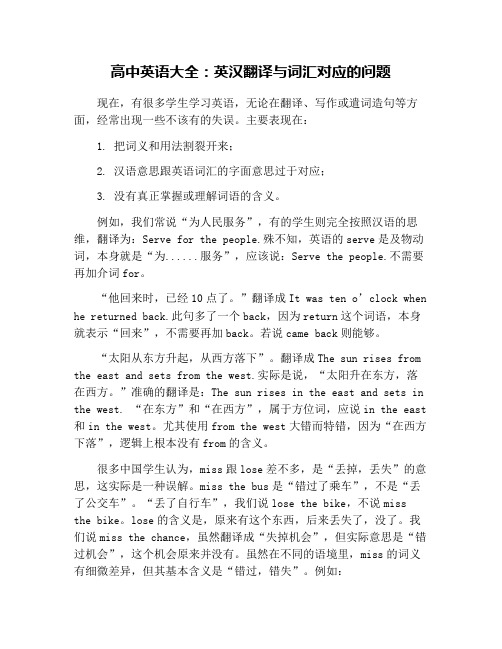
高中英语大全:英汉翻译与词汇对应的问题现在,有很多学生学习英语,无论在翻译、写作或遣词造句等方面,经常出现一些不该有的失误。
主要表现在:1. 把词义和用法割裂开来;2. 汉语意思跟英语词汇的字面意思过于对应;3. 没有真正掌握或理解词语的含义。
例如,我们常说“为人民服务”,有的学生则完全按照汉语的思维,翻译为:Serve for the people.殊不知,英语的serve是及物动词,本身就是“为......服务”,应该说:Serve the people.不需要再加介词for。
“他回来时,已经10点了。
”翻译成It was ten o’clock when he returned back.此句多了一个back,因为return这个词语,本身就表示“回来”,不需要再加back。
若说came back则能够。
“太阳从东方升起,从西方落下”。
翻译成The sun rises from the east and sets from the west.实际是说,“太阳升在东方,落在西方。
”准确的翻译是:The sun rises in the east and sets in the west. “在东方”和“在西方”,属于方位词,应说in the east 和in the west。
尤其使用from the west大错而特错,因为“在西方下落”,逻辑上根本没有from的含义。
很多中国学生认为,miss跟lose差不多,是“丢掉,丢失”的意思,这实际是一种误解。
miss the bus是“错过了乘车”,不是“丢了公交车”。
“丢了自行车”,我们说lose the bike,不说missthe bike。
lose的含义是,原来有这个东西,后来丢失了,没了。
我们说miss the chance,虽然翻译成“失掉机会”,但实际意思是“错过机会”,这个机会原来并没有。
虽然在不同的语境里,miss的词义有细微差异,但其基本含义是“错过,错失”。
初中英语易混动词辨析

易混动词及短语动词1.beat和win的区别beat表示“打败”,后面跟的宾语是对手;win表示“赢得”,后面跟比赛或活动等作宾语。
如:They beat the Giants by a score of 7 to 3. 他们以7比3战胜了巨人队。
Though it was not easy, they won the game at last. 虽然不容易,他们最后还是赢了比赛。
2.carry, take与bring的区别take是指将某物或某人从这里“带到”或“拿到”某处。
bring与take相反,是指将某物或某人从别处“带来”或“拿来”。
carry是指随身携带(背着、扛着、提着、抱着),不表明来去的方向。
fetch常指从说话地到另外一个地店,取回某物。
如:Please help me take it to the classroom. 请帮我把它拿到教室去。
May I bring Tom to see you next Monday? 我下周一能带Tom来见你吗?The box is heavy. Can you carry it? 这个盒子太重了,你能拿得起来吗?Fetch a glass of water for me, please. 请给我拿杯水来。
3.cross和across的区别cross与across都表示“穿过;横过"的意思。
但是cross 是及物动词,across是介词,across 是前面必须还要有谓语动词。
如:Is it safe to cross the road now? 现在过马路安全吗?Go across the bridge. You'll find the museum on the left. 走过这座桥,你就会在左边找到那个博物馆。
4.hear与listen to的区别动词hear与listen to之间的区别,同see与look at之间的区别非常相似。
unit12-Life-is-full-of-the-unepected课文知识点详解
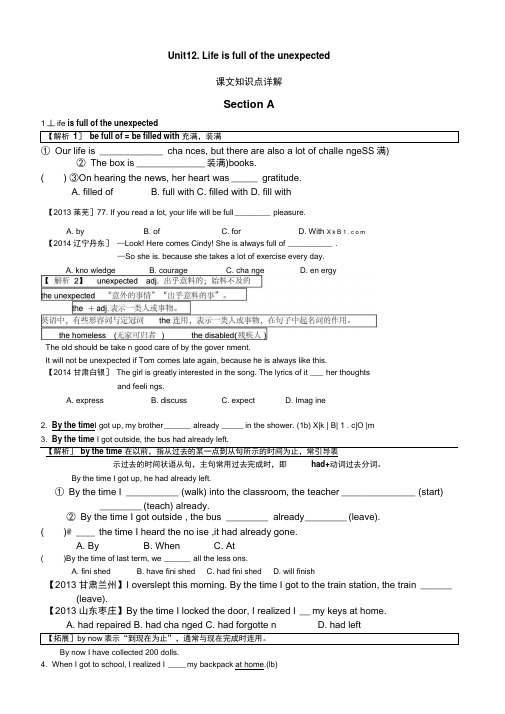
Unit12. Life is full of the unexpected课文知识点详解Section A1丄ife is full of the unexpected① Our life is ____________ cha nces, but there are also a lot of challe ngeSS满)② The box is _____________ 装满)books.( ) ③On hearing the news, her heart was _____ gratitude.A. filled ofB. full withC. filled withD. fill with【2013 莱芜]77. If you read a lot, your life will be full ________ pleasure.A. byB. ofC. forD. With X k B 1 . c o m【2014 辽宁丹东]—Look! Here comes Cindy! She is always full of __________ .—So she is. because she takes a lot of exercise every day.A. kno wledgeB. courageC. cha ngeD. en ergyThe old should be take n good care of by the gover nment.It will not be unexpected if Tom comes late again, because he is always like this.【2014 甘肃白银]The girl is greatly interested in the song. The lyrics of it ___ her thoughtsand feeli ngs.A. expressB. discussC. expectD. Imag ine2. By the time I got up, my brother ______ already _____ in the shower. (1b) X|k | B| 1 . c|O |m3. By the time I got outside, the bus had already left.【解析]by the time 在以前,指从过去的某一点到从句所示的时间为止,常引导表示过去的时间状语从句,主句常用过去完成时,即had+动词过去分词。
中考英语知识点讲解 (11)

2. be against doing sth. “反对做某事”。如: I’m against doing anything till the police arrive. 我反对在警察到达之前采取任何行动。
3. against表示“靠着”“顶着”“迎着”“衬着”等。如: He stood with his back against the door. 他背靠门站着。 He hit his head against the window. 他的头撞到了窗户上。 It is difficult to see anything against this bright light. 对着这种强光很难看到任何东西。 Bright red flags flow in the wind against the blue sky. 鲜艳的红旗映衬着蓝天迎风飘扬。
2. remind sb. to do sth. “提醒某人做某事” Please remind me to finish my work. 请提醒我完成工作。 Be sure to remind her to come back early. 一定要提醒她早点回来。
3. remind sb. + that从句 He reminded me that I should answer the letter as early as possible. 他提醒我尽早回信。 May I remind you that time will soon be up? 我能提醒下你吗?时间快到了。
考点 3
forget是忘记,不再把某事放心上,忽视、 忽略的意思;leave是遗忘、丢下的意思。
1. forget的一般用法是:forget sth./sb. “忘记某事/ 某人”, forger to do sth.“忘记去做某事”或 forget doing sth.“忘记曾做过某事”; leave的一般用法是:leave sth.+介词+ sp. “ 把某物忘在某地” 。如: I forget to bring my book. I left my book at home.
高中英语词汇:leaveforget区别

①forget是忘记,不再把某事放⼼上,忽视忽略的意思。
leave是遗忘,丢下的意思。
具体⽤法上,forget⼀般是forger to do sth(忘记去做)或forget doing sth(忘记曾做过的事),这时不能⽤leave;leave⼀般是leave sth sp(把某物忘在某地),这时不能⽤forget。
②forget指抽象的:I forget to bring my book.(带书是抽象的动作)leave指具体的:I left my book at home.(书是具体事物)③forget 表⽰“忘记某物”时,不接表⽰地点的词语。
如:He forgot his English book this morning.leave 指将某物遗忘在某个地⽅,其后要接表⽰地点的词语。
如:The little girl left her English book at home this morning.[试题演练]1 . I've _________his address.2 . I_________ my umbrella at home yesterday.( Keys : 1. forgotten 2. left )depart[英][dɪˈpɑ:t] [美][dɪˈpɑ:rt]v.离开,出发; 去世; 离职; 脱轨;第三⼈称单数:departs 过去分词:departed 现在进⾏时:departing 过去式:departed1.VERB 离开; 启程; 动⾝; 出发When something or someone departs from a place, they leave it and start a journey to another place.2.VERB 背离; 违背If you depart from a traditional, accepted, or agreed way of doing something, you do it in a different or unexpected way.3.VERB 辞(职); 离(职)If someone departs from a job, they resign from it or leave it. In American English, you can say that someone departs a job.例句:1.But not all of the hive members depart. 但并⾮所有的成员都会离开旧蜂房。
七年级英语下册Lesson63教材内容详解冀教版

Lesson 63Good –Bye, Li Ming再见,李明课文英汉对照THINK ABOUT IT! 想一想!●Has a friend ever visited you?Were you sad when he/she left?曾经有朋友拜访过你吗?当他/她离开时,你难过吗?●How do Danny and Jenny feel about Li Ming?丹尼和詹妮对李明是怎样的感觉?“’m sad!”says Li Ming.“现在我们在机场。
我很难过!”李明说。
“I’m sad ,too,Li Ming.How long is the trip?”asks Danny.“我也很伤心,李明。
旅程是多长时间?”丹尼问。
“It’s eleven hours to Beijing,”says Li Ming. “到十一个小时。
”李明说。
“That’s a long trip!”says Danny.“真是长时间的旅行!”丹尼说。
“The plane for Beijing will leave in fifteen minutes,”a voice says.“飞往的飞机十五分钟后将要离开,”一个声音说。
“Who said that?”cries Danny.“谁说的话?”丹尼大喊。
Jenny laughs, “’t be scared!”詹妮大笑,“那是机场工作人员,别害怕!”“It’s time for me to go,”Li Ming says to “Open it!”says Li Ming.He gives Danny a gift. “打开它!”李明说,他给了丹尼一件礼物。
“Oh,It’s a kite,”says Danny, a little unhappily. “哦!它是一只风筝。
”丹尼有点不高兴的说。
“Yes!It’s a good Chinese kite,Danny.You can fly it!Iknow you can!”says Li Ming.“是的!这是一只好的中国风筝,你能把它放起来!我知道你能!”李明说。
- 1、下载文档前请自行甄别文档内容的完整性,平台不提供额外的编辑、内容补充、找答案等附加服务。
- 2、"仅部分预览"的文档,不可在线预览部分如存在完整性等问题,可反馈申请退款(可完整预览的文档不适用该条件!)。
- 3、如文档侵犯您的权益,请联系客服反馈,我们会尽快为您处理(人工客服工作时间:9:00-18:30)。
leave与forget的用法区别
请先看下面两道中考题:
1. —Sorry, Mr. Green. I _____ my English book at home.
—That’s OK, but don’t forget next time. (淄博市中考英语)
A. forgot
B. forget
C. left
D. kept
2. This morning I went to work in such a hurry that _____ the key to my office at home. (青岛市中考英语)
A. forgot
B. left
C. missed
D. lost
这两道题的答案分别为C和B,即答案均选left。
许多同学也许会弄不明白,因为根据句意,这两道题均应填表示“忘记”的词语,为什么不可以用forgot而非要用left呢?下面我们就来分析一下它们在表示“忘记”时的区别。
leave和forget均可表示“遗忘”,其区别为:
1. forget通常不能与表示地点的副词或短语连用。
如:
Oh, I’ve forgotten my wallet. 噢,我忘记带钱包了。
Don’t forget the cases. 别忘了带箱子。
Oh, I’ve forgotten my key. 噢,我忘记带我的钥匙了。
Don’t forget the tickets and an unbrella. 别忘了带戏票和雨伞。
2. leave 在表示“遗忘”时,则通常要与表示地点的状语连用。
如:
Oh, I’ve left my wallet at home. 噢,我的钱包放在家里忘记带了。
“I’ve left my watch upstairs.” “I’ll go and get it for you.” “我把表忘在楼上了。
”“我去给你拿。
”
She left the bag on the bus but it may not be there any longer. 她把包忘在了公共汽车上,可是现在也许不在那儿了。
Those who leave parcels on the train cannot expect to get them back. 把东西遗忘在火车上的人,别期望能找回失物。
注:有时leave连用的状语可能是疑问词where。
如:
Where did I leave my shopping? 我把买到的东西忘在哪儿了?。
